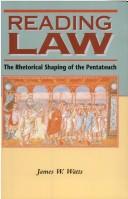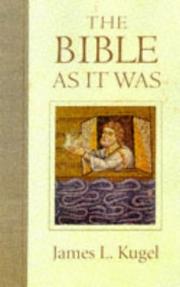| Listing 1 - 7 of 7 |
Sort by
|
Book
ISBN: 1575068648 1575062860 Year: 2014 Publisher: Winona Lake : Eisenbrauns,
Abstract | Keywords | Export | Availability | Bookmark
 Loading...
Loading...Choose an application
- Reference Manager
- EndNote
- RefWorks (Direct export to RefWorks)
This book on the Yahwist comes at the end of a long career of research on the Pentateuch in general and the Yahwist in particular. Van Seters’s interest in the Yahwist was stimulated by the 1964 presidential address of the Society of Biblical Literature, given by Professor Fredrick Winnett, “Rethinking the Foundations,” which focused on the Yahwist in Genesis. This interest followed a path of work on issues surrounding the Yahwist that culminated in three volumes, Prologue to History: The Yahwist as Historian in Genesis (1992), The Life of Moses: The Yahwist as Historian in Exodus–Numbers (1994), and A Law Book for the Diaspora: Revision in the Study of the Covenant Code (2003).Over the last few years, it has become clear to Van Seters that readers of the three volumes on the Yahwist, which total more than 1,000 pages, easily lose sight of the Yahwist’s work as a whole and the way in which it provides a historical prologue and framework for D and the DtrH. In this book, Van Seters seeks to provide a summary sketch of the J history and to make clear how the Priestly corpus has been composed as a supplement to the Yahwist with a radically different form and point of view that has obscured the Yahwist’s historical narrative and theological perspective. Part one lays out in simple terms the basic form, structure, and theological perspective of the Yahwist’s history, where it has been interrupted by the inclusions of P, and how it is integrated into DtrH. The essays in part two are intended to bring the scholarly discussion of Van Seters’s earlier books on the Yahwist more up to date, and their order corresponds roughly to the order of the narrative in the first part of the book. Some of these articles have been published previously, but others are new and quite recent, including “The Yahwist as Historian.
Book
ISBN: 0773418342 9780773418349 Year: 2011 Publisher: Lewiston The Edwin Mellen Press
Abstract | Keywords | Export | Availability | Bookmark
 Loading...
Loading...Choose an application
- Reference Manager
- EndNote
- RefWorks (Direct export to RefWorks)
What characterizes the proper ethical treatment of animals as outlined in the Old Testament? Animals play an important role in the Old Testament, and in particular the Pentateuch. Ritual sacrifices were a part of the ancient traditions, and there are rules written into the laws that pertain to this practice as well as the religious approach to animals and nature. In the oft quoted passage from Genesis the call is to not only be fruitful and multiply, but to reign over the earth and subdue it along with the animals that God created. The author explores the fallout of an anthropocentric way of a
Book
ISBN: 9780367699413 0367699419 Year: 2023 Publisher: London ; New York Routledge, Taylor et Francis Group
Abstract | Keywords | Export | Availability | Bookmark
 Loading...
Loading...Choose an application
- Reference Manager
- EndNote
- RefWorks (Direct export to RefWorks)
Early Israel offers the most sweeping reinterpretation of the Pentateuch since the nineteenth-century Documentary Hypothesis. Engaging a dozen-plus modern academic disciplines--from anthropology, biblical studies, Egyptology and semiotics, to linguistics, cognitive poetics and consciousness studies; from religious studies, Jewish studies, psychoanalysis and literary criticism, to mysticism studies, cognitive psychology, phenomenology and philosophy of mind--it wrests from the Pentateuch an outline of the heretofore undiscovered ancient Israelite mystical-initiatory tradition of the First Temple priests. The book effectively launches a new research area: Pentateuchal esoteric mysticism, akin to a "center" or "organizing principle" discussed in biblical theology. The recovered priestly system is discordant vis--vis the much-later rabbinical project. This volume appeals to a diverse academic community, from Biblical and Jewish studies to literary studies, religious studies, anthropology, and consciousness studies.
Book
ISBN: 3161550145 3161540549 9783161540547 9783161550140 Year: 2016 Publisher: Tübingen Mohr Siebeck
Abstract | Keywords | Export | Availability | Bookmark
 Loading...
Loading...Choose an application
- Reference Manager
- EndNote
- RefWorks (Direct export to RefWorks)
Spiegelt sich die Zerstörung Jerusalems durch die Babylonier 587 v.Chr. in den fünf Büchern Mose wieder? Diese umstrittene Frage wird in diesem Band von internationalen Experten in archäologischer, historischer und literarischer Hinsicht beleuchtet.
Bible. --- Criticism, interpretation, etc. --- Jerusalem --- History --- Frühjudentum --- Archäologie --- Religionsgeschichte --- early Judaism --- Geschichte Israels --- Pentateuchkritik --- Archaeology --- Pentateuch criticism --- history of Israel --- history of religion --- Altorientalistik --- Antike Religionsgeschichte --- Antike --- Altes Testament

ISBN: 1850759979 9781850759973 Year: 1999 Volume: 59 Publisher: Sheffield Sheffield academic press
Abstract | Keywords | Export | Availability | Bookmark
 Loading...
Loading...Choose an application
- Reference Manager
- EndNote
- RefWorks (Direct export to RefWorks)
Watts here argues that conventions of oral rhetoric were adapted to shape the literary form and contents of the Pentateuch. The large-scale structure-stories introducing lists of laws that conclude with divine sanctions-reproduces a common ancient strategy for persuasion. The laws' use of direct address, historical motivations and frequent repetitions serve rhetorical ends, and even the legal contradictions seem designed to appeal to competing constituencies. The instructional speeches of God and Moses reinforce the persuasive appeal by characterizing God as a just ruler and Moses as a faithfu
Bible. --- Criticism, interpretation, etc. --- 222.1 --- 221.08*2 --- Octateuch. Heptateuch. Hexateuch. Pentateuch. Boeken van Mozes --- Theologie van het Oude Testament: moraal; ethica; juridica Israelis; vroomheid --- Bible -- Study ang teaching. --- Bible. O.T. Pentateuch -- Commentaries. --- Bible. O.T. Pentateuch -- Criticism, interpretation, etc. --- 221.08*2 Theologie van het Oude Testament: moraal; ethica; juridica Israelis; vroomheid

ISBN: 0674069404 Year: 1997 Publisher: Cambridge, Mass. Harvard University Press
Abstract | Keywords | Export | Availability | Bookmark
 Loading...
Loading...Choose an application
- Reference Manager
- EndNote
- RefWorks (Direct export to RefWorks)
Bible --- 222.1 --- Octateuch. Heptateuch. Hexateuch. Pentateuch. Boeken van Mozes --- Bible. --- Chumash --- Five Books of Moses --- Ḥamishah ḥumshe Torah --- Ḥumash --- Kitāb-i Muqqadas --- Mose Ogyŏng (Book of the Old Testament) --- Pentateuch --- Pi︠a︡toknizhīe Moiseevo --- Sefer Ḥamishah ḥumshe Torah --- Tawrāh --- Torà (Pentateuch) --- Torah (Pentateuch) --- Tʻoris xutʻcigneuli --- Ureta --- תורה --- Haftarot --- Criticism, interpretation, etc. --- History. --- Bible. O.T. Pentateuch --- Criticism, interpretation, etc --- History --- Bible. - O.T. - Pentateuch - Criticism, interpretation, etc. - History.
Book
ISBN: 0773418032 9780773418035 Year: 2007 Publisher: Lewiston Edwin Mellen Press
Abstract | Keywords | Export | Availability | Bookmark
 Loading...
Loading...Choose an application
- Reference Manager
- EndNote
- RefWorks (Direct export to RefWorks)
This study explores in literalism and inerrancy as the interpretive basis of some Jewish, Christian and Muslim justifications of acts of violence. In the end, an argument is made, on historical, scriptural, moral and theological grounds, rejecting Holy War as a perversion of God's creation.
Bible. N.T. -- Criticism, interpretation, etc. --- Bible. O.T. Pentateuch -- Criticism, interpretation, etc., Jewish. --- Koran -- Criticism, interpretation, etc. --- Sacred books -- History and criticism. --- War -- Religious aspects. --- War --- Sacred books --- Religion --- Philosophy & Religion --- Religion - General --- War (in religion, folk-lore, etc.) --- War and religion --- Religious aspects --- History and criticism --- Bible. --- Qurʼan --- Criticism, interpretation, etc., Jewish . --- Criticism, interpretation, etc. --- Chumash --- Five Books of Moses --- Ḥamishah ḥumshe Torah --- Ḥumash --- Kitāb-i Muqqadas --- Mose Ogyŏng (Book of the Old Testament) --- Pentateuch --- Pi︠a︡toknizhīe Moiseevo --- Sefer Ḥamishah ḥumshe Torah --- Tawrāh --- Torà (Pentateuch) --- Torah (Pentateuch) --- Tʻoris xutʻcigneuli --- Ureta --- תורה --- Haftarot --- Al-Coran --- Al-Qur'an --- Alcorà --- Alcoran --- Alcorano --- Alcoranus --- Alcorão --- Alkoran --- Coran --- Curān --- Gulan jing --- Karan --- Koran --- Koranen --- Korani --- Koranio --- Korano --- Ku-lan ching --- Ḳurʼān --- Kurāna --- Kurani --- Kuru'an --- Qorān --- Quräan --- Qurʼān al-karīm --- Qurʺon --- Xuraan --- Κοράνιο --- Каран --- Коран --- קוראן --- قرآن --- Ba-yon Tipan --- Bagong Tipan --- Jaji ma Hungi --- Kainē Diathēkē --- New Testament --- Nouveau Testament --- Novo Testamento --- Novum Testamentum --- Novyĭ Zavet --- Novyĭ Zavi︠e︡t Gospoda nashego Īisusa Khrista --- Novyĭ Zavit --- Nuevo Testamento --- Nuovo Testamento --- Nye Testamente --- Perjanjian Baru --- Dhamma sacʻ kyamʻʺ --- Injīl
| Listing 1 - 7 of 7 |
Sort by
|

 Search
Search Feedback
Feedback About UniCat
About UniCat  Help
Help News
News